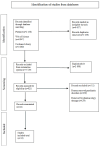Prognostic Evaluation of Disorders of Consciousness by Using Resting-State fMRI: A Systematic Review
- PMID: 39407763
- PMCID: PMC11477135
- DOI: 10.3390/jcm13195704
Prognostic Evaluation of Disorders of Consciousness by Using Resting-State fMRI: A Systematic Review
Abstract
Background: This review focuses on the prognostic role of resting-state functional magnetic resonance imaging (fMRI) in disorders of consciousness (DOCs). Several studies were conducted to determine the diagnostic accuracy in DOC patients to identify prognostic markers and to understand the neural correlates of consciousness. A correct diagnosis of consciousness in unresponsive or minimally responsive patients is important for prognostic and therapeutic management. Functional connectivity is considered as an important tool for the formulation of cerebral networks; it takes into account the primary sensorimotor, language, visual and central executive areas, where fMRI studies show damage in brain connectivity in the areas of frontoparietal networks in DOC patients. Methods: The integration of neuroimaging or neurophysiological methods could improve our knowledge of the neural correlates of clinical response after an acquired brain injury. The use of MRI is widely reported in the literature in different neurological diseases. In particular, fMRI is the most widely used brain-imaging technique to investigate the neural mechanisms underlying cognition and motor function. We carried out a detailed literature search following the relevant guidelines (PRISMA), where we collected data and results on patients with disorders of consciousness from the studies performed. Results: In this review, 12 studies were selected, which showed the importance of the prognostic role of fMRI for DOCs. Conclusions: Currently there are still few studies on this topic. Future studies using fMRI are to be considered an added value for the prognosis and management of DOCs.
Keywords: cognitive rehabilitation; consciousness; minimally conscious state; recovery of consciousness; resting-state fMRI; vegetative state.
Conflict of interest statement
The authors declare no conflicts of interest.
Figures
References
Publication types
Grants and funding
LinkOut - more resources
Full Text Sources


